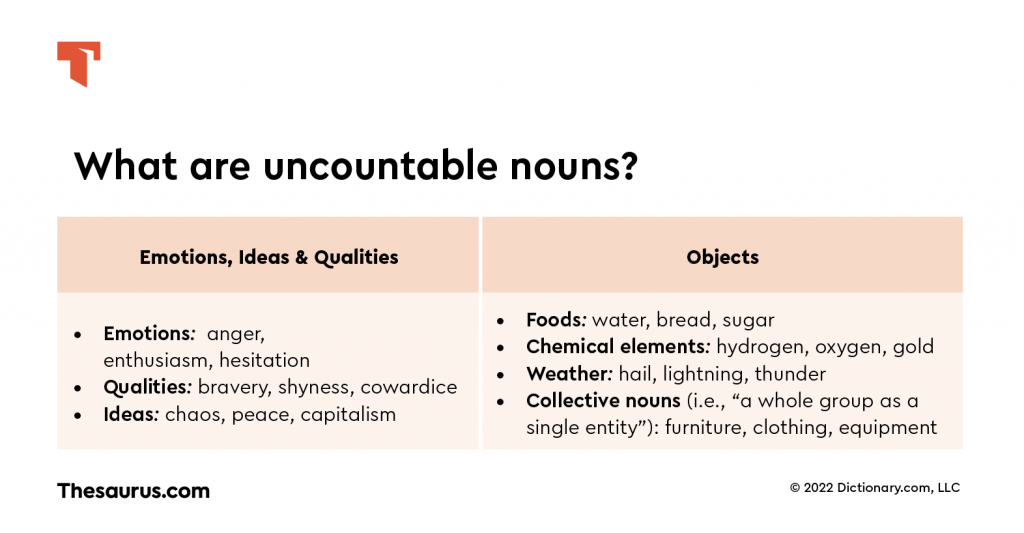Have you ever had influenza? Do you like to spread gossip? Did you have a nice childhood? Are these questions causing you confusion? Don’t worry, you aren’t being graded right now.
We just wanted to ask some questions that use nouns, words that we use to refer to people, places, things, or ideas. We use many different types of nouns in our speech and writing, but the nouns influenza, gossip, childhood, and confusion are all the same type of noun known as an uncountable noun.
What is an uncountable noun?
An uncountable noun, also called a mass noun, is “a noun that typically refers to an indefinitely divisible substance or an abstract notion, and that in English cannot be used, in such a sense, with the indefinite article or in the plural.”
What exactly does this mean in less technical language? Well, an uncountable noun refers to something that can’t be counted with numbers. For that reason, uncountable nouns normally don’t use the articles a or an and don’t have plural forms. For example, you don’t feel a happiness nor does the noun Pacific Ocean have a plural form (we don’t have Pacific Oceans). It would also be pretty weird to try to count things referred to by uncountable nouns, such as 1 peace or 37 peaces.
However, an uncountable noun may use a plural verb if it is treated as a plural word. For example, the word police is an uncountable noun (you can’t have two or three polices) but it uses a plural verb as in The police are on their way.
One last thing to keep in mind is that many words have multiple meanings and so a noun may be an uncountable noun or not depending on context. For example, the word iron is an uncountable noun when it is referring to the chemical element (a molecule doesn’t have three irons) but it is not an uncountable noun when referring to an appliance used to get wrinkles out of clothing (you can buy three irons at the store).
Uncountable noun examples
Uncountable nouns can be hard to spot, so let’s look at some examples.
Emotions, ideas, and concepts
Most uncountable nouns refer to intangible concepts or abstract ideas. Because these things don’t actually exist as material objects, it would usually be impossible to count them. However, not all abstract nouns are uncountable nouns. It is possible to have three possibilities or to have a concern and so these are not uncountable nouns. If you can count a noun, it’s known as a countable noun—and we’ll discuss these too shortly.
- Emotions: sadness, anger, enthusiasm, hesitation, unease
- Qualities: bravery, shyness, cowardice, agility, intelligence, pride
- Ideas: chaos, peace, anarchy, nihilism, capitalism
Objects
Sometimes, objects are referred to using uncountable nouns. These too might have a sense in which they are also used as countable nouns.
- Foods: water, milk, bread, honey, sugar, meat, pork
- Chemical elements: hydrogen, oxygen, gold, uranium
- Weather: rain, snow, fog, hail, lightning, thunder, sleet
- Collective nouns (i.e., “a whole group as a single entity”): furniture, clothing, equipment, machinery
Uncountable nouns and fewer vs. less
Uncountable nouns lead us to the heated fewer vs. less debate. In general, we use fewer with countable nouns as in I need to buy fewer apples next time and less with uncountable nouns as in I think the puppy did better with less discipline. However, there are many exceptions to this general rule, such as when referring to distances as in The store is less than three miles away.
The words less and fewer are used interchangeably more and more often in everyday day speech (no matter how grammar purists may feel about it—and they often feel very strongly about it).
List of uncountable nouns
Uncountable nouns can be difficult to find, so let’s put together a list of uncountable nouns you are likely to see.
- aggression, bookishness, calm, dedication, entertainment, fun, gratitude, help, isolation, junk, kleptomania, laziness, mustard, news, originality, patience, quiet, rice, stuff, traffic, ugliness, vastness, wanderlust, xenon, yoga, zest
The difference between uncountable & countable nouns
While uncountable nouns refer to things that can’t be counted, countable nouns refer to people, places, and things that can be counted. Unlike uncountable nouns, countable nouns will often use the articles a or an and can have singular or plural forms. Countable nouns are much more common than uncountable nouns, and it is usually straightforward to tell if a person, place, or thing can be counted or not. But grammar likes to throw plenty of curveballs, too.
You will need to watch out for words that can be either an uncountable or a countable noun depending on meaning and context. Also remember that not all collective nouns and abstract nouns are uncountable nouns: the word problem is an abstract noun and a countable noun (you can have a problem or 99 problems). The word army is a collective noun, and it too is a countable noun (you can be a member of an army and a battle could involve two armies).
Let’s finish things up with a test of your understanding of uncountable nouns. Read each of the following sentences and see if you can figure out why each noun is or is not an uncountable noun.
- He suffered from loneliness.
- She has a lot of pets.
- They came to an agreement.
- She has nerves of steel.
- The bucket was filled with wine.
- Charles’s cellar is full of expensive wines.
This topic might just inspire you to say: I love grammar (uncountable), but those nouns (countable) cause me trouble.
You can count on Grammar Coach™
We’ve got a noun for you: genius! And that’s what you’ll be when you check your writing on Thesaurus.com’s Grammar Coach™. Grammar Coach™ uses machine learning technology uniquely designed to catch grammar and spelling errors. Its Synonym Swap will find the best nouns, adjectives, and more to help say what you really mean, guiding you toward clearer, stronger, writing.
Whether you’re writing about a person, place, or thing, perfect grammar has never been easier!
Answers: 1. Uncountable 2. Countable 3. Countable 4. Uncountable 5. Uncountable 6. Countable
















